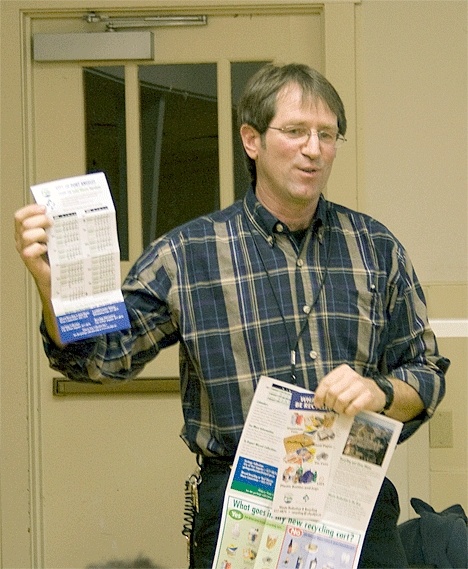Island County and Island Disposal employees made up nearly half of the roughly 20-member audience at the Island County roadside recycling information meeting at the Coupeville Recreation Hall.
No one disputed the fact that Island County’s sub-par, 28-percent recycle rate needs improvement; rather, the presentation and discussion centered on how to do it.
There’s no written proposal yet. But there are a few proposed guidelines, such as roadside recycling collection service every other week in a 96-gallon can, with the option for a 64-gallon or smaller container, according to Jerry Mingo, Island County’s recycle and hazardous waste coordinator.
If adopted, a mandatory roadside recycling collection service would apply to all Coupeville residents who live in homes described as “single family up to and including four-plex residences,” Mingo said.
Mingo explained that residents of the 9,430 households in unincorporated Island County could elect to self-haul their trash, or subscribe to garbage collection. If a roadside recycling program is adopted, county residents who subscribe to trash collection service must also pay for the collection of recyclables. The proposed policy, in other words, is all or nothing.
Island Disposal’s failure to notify its subscribers of its decision to stop the clear plastic bag recycle program didn’t sit well with county resident Helen Kinsella.
“It was disappointing to me to find out I’ve been doing this all this time and it’s just been thrown in the garbage,” she said. “If the clear plastic bag program was going to stop, notice should have been given.”
Island Disposal District Manager Kent Kovalenko took responsibility for the oversight.
“You’re right. We dropped the ball on that,” he said of the program that was discontinued earlier this year for economic reasons.
Island Recycling, owned by Waste Connections, also recently stopped paying people to go though the garbage and pick out recyclables, again for economic reasons.
Roadside recycling wasn’t an option in years past, said Janet Hall, Waste Wise program coordinator for WSU Extension, because there simply weren’t enough people to make it profitable for Island Disposal.
“We now have the population to make it economically feasible,” she said. “If you make it more convenient, people will recycle.”
The Coupeville meeting was one of three gatherings scheduled to gather public comment on the possibility of a roadside recycling collection service.
Island County commissioners John Dean, Angie Homola and Helen Price Johnson will use the public comments to determine if Island County Public Works staff should draft a service level ordinance, or proposal, for roadside recycling collection.
Homola attended the north end meeting and Price Johnson attended the South Whidbey meeting. Dean did not attend the meeting in Coupeville.
The commissioners could also decide that roadside recycling isn’t the way to go, Mingo said. In that case, the idea of a recyclables collection service in Island County could be dropped and public works would have to conjure another way to improve the county’s 28-percent recycling rate.
“Anything can happen here,” he said.
If the commissioners give public works the green light to draft a first proposal, it could have the draft completed by the end of November, Mingo said.
The community will also have an opportunity to give their two-cents on the draft at a public hearing before the commissioners vote on the proposal.
The commissioners could approve or deny the initial draft by the end of the year. Should they adopt it, Mingo said the proposal would then go to officials at Island Disposal Waste Connections who would add their cost requirements for disposal of the recyclable materials collected.
Unlike the county’s effort to start a similar service in 2007, this go-around will include a “sunset clause” that allows the county to break from its agreement with Island Disposal.
The next stop would be the Washington State Utilities and Transportation Commission, a state agency that regulates rates. A public hearing and comment period is also part of this process, which can take up to three months.
This step is to ensure consumer protection, Mingo said.



